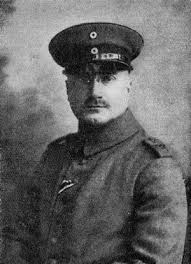 Born in 1874 in Munster, Germany, August Stramm was an expressionist poet and playwright but was a relative late comer to writing poetry. His father was a civil servant and Stramm’s early life found him working in a similar field as a clerk for the post office although his mother wanted him to enter clergy and become a priest.
Born in 1874 in Munster, Germany, August Stramm was an expressionist poet and playwright but was a relative late comer to writing poetry. His father was a civil servant and Stramm’s early life found him working in a similar field as a clerk for the post office although his mother wanted him to enter clergy and become a priest.
In 1896 he undertook a post in the overseas division of the postal service and was based in Bremen but was able to journey abroad to the United States on several occasions. That may have influenced his writing style in later life as he came into contact with writers such as Trine and Mulford.
Stramm married in 1902 and finally settled in Berlin, studying communications technology in the post office college there. A few years later he undertook a degree in politics and economics at the university and, by 1909, he had earned himself a PhD.
Stramm struggled to get his literary career off the ground although he is now considered one of the more important avante-garde poets of his generation and he may well have influenced the future development of the Dada Movement. He started to write his play The Peasants around the time that he got married in 1902 and had finished it by 1905, though it was never actually produced until the late 20s, sometime after his death.

Around 1914, Stramm became friends with Herwath Walden and the two created Der Sterm, a magazine devoted to expressionist ideals and in which he began to publish his poems. Walden was a great encouragement and would be instrumental in the publishing of Stramm’s after he was killed in action.
In Germany before the war it was not unusual for many men to be part of the reservist corps and Stramm was no exception, promoted to the rank of captain when he was part of the Prussian Army in 1913.
When war broke out in August 1914, he quickly received his call up papers and first of all went to France before heading for the Eastern Front. Stramm fought in a large number of battles during the conflict, often writing verses that would set him down as one of the premier war poets of his generation. Walden published some of his works in Der Sterm whilst Stramm was still at the front.

In January 1915, Stramm was awarded the Iron Cross for his bravery on the Western Front. In September of the same year, Stramm’s unit was attacked in swampland near the town of Gorodenka, Russia, and he was killed during hand to hand combat. He was 40 years old.
Herwath Walden began the long task of publishing Stramm’s work after he had heard of his friend’s death. Du: Liebesgedichte was published in the same year and was a collection of the poet’s earlier works that dwelled on love and eroticism. His war poems, Dripping Blood, were not published until 1919 perhaps because of the raw nature of the German psyche after the cessation of hostilities.

